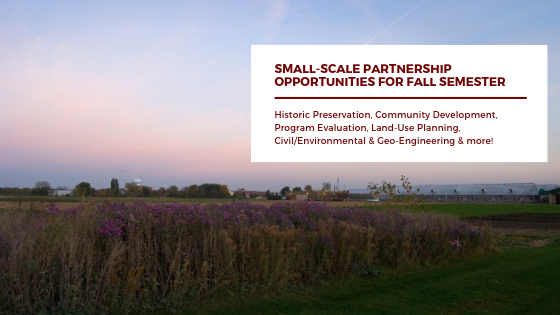The Resilient Communities Project accepts Small-Scale Partnership proposals on a rolling basis for a wide range of project topics across all divisions and departments in your agency.
Below are some specific topic areas where we have specific capacity for fall semester (though project ideas on any topic are always welcome). These classes are taught by faculty we have partnered with in the past. Examples of previous student work from these classes is available on the University Digital Conservancy, and upon request.
For more information on these topic areas and the many other topics we are able to accommodate, visit our Application Page or contact us at [email protected]. We will work with you and your organization to learn about your project and customize a partnership to meet your community’s needs.
- Urban Hydrology & Water Quality: Students analyze community stormwater management issues and apply best practices. Past projects have included applying best management practices to improve water quality in lakes, water re-use investigations, pond clean-up strategies, application of effective impervious areas to a watershed, and more. Students will develop a report and deliver a presentation.
- Historic Restoration or Preservation: Students analyze a historic building in your community and provide recommendations for restoration or preservation.
- Community Development: Students develop techniques and strategies for your economic development and planning project through a market analysis, feasibility study, or development plan.
- Program Evaluation: Students apply a theoretical framework and practical strategies to evaluate your community program or initiative.
- Land-Use Planning: Students create a series of research posters, including visuals and renderings. For this fall semester, your project must include planning for autonomous and connected vehicles in some capacity.
- Civil, Environmental & Geo-Engineering: Students solve engineering problems from the conceptual stage through preliminary planning, public hearings, design, environmental impact statements, final plans/specifications, and award of contracts. Students work on projects related to any area of civil, environmental, and geo-engineering. Note: The project lead must be a certified engineer. Fall and spring semester options available. For fall semester, a preliminary project description is due by August 1.
